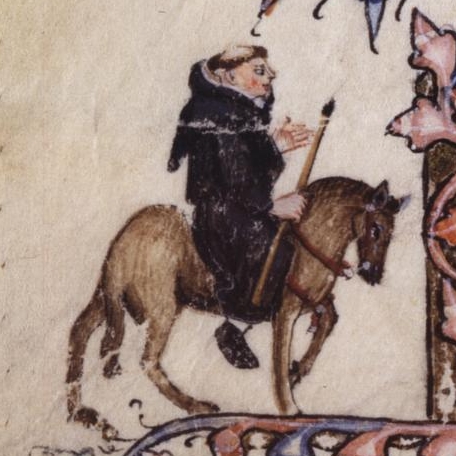|
This false theef, this somonour, quod the Frere, |
| 75 |
Hadde alwey bawdesredy to his hond, |
|
As any hauk to lure in Engelond, |
|
That tolde hym al the secree that they knewe; |
|
For hire acqueyntace was nat come of newe. |
|
They weren his approwours prively. |
| 80 |
He took hymself a greet profit therby; |
|
His maister knew nat alwey what he wan. |
|
Withouten mandementa lewed man |
|
He koude somne, on peyne of Cristes curs, |
|
And they were glade for to fille his purs, |
| 85 |
And make hym grete feestes atte nale. |
|
And right as Judas hadde purses smale, |
|
And was a theef, right swich a theef was he; |
|
His maister hadde but half his duetee. |
|
He was, if I shal yeven hym his laude, |
| 90 |
A theef, and eek a somnour, and baude. |
|
He hadde eek wenches at his retenue, |
|
That, wheither that sir Robert or sir Huwe, |
|
Or Jakke, or Rauf, or whoso that it were |
|
That lay by hem, they tolde it in his ere. |
| 95 |
Thus was the wenche and he of oon assent; |
|
And he wolde fecche a feyned mandement, |
|
And somne hem to chapitre bothe two, |
|
And pile the man, and lete the wenche go. |
|
Thanne wolde he seye, ‘Freend, I shal for thy sake |
| 100 |
Do striken hire out of oure lettres blake; |
|
Thee thar namoore as in this cas travaille. |
|
I am thy freend, ther I thee may availle.’ |
|
Certeyn he knew of briberyes mo |
|
Than possible is to telle in yeres two. |
| 105 |
For in this world nys dogge for the bowe |
|
That kan an hurt deer from an hool yknowe |
|
Bet than this somnour knew a sly lecchour, |
|
Or an avowtier, or a paramour. |
|
And for that was the fruyt of al his rente, |
| 110 |
Therfore on it he sette al his entente. |
|
And so bifel that ones on a day |
|
This somnour, evere waityng on his pray, |
|
Rood for to somne an old wydwe, a ribibe, |
|
Feynynge a cause, for he wolde brybe. |
| 115 |
And happed that he saugh bifore hym ryde |
|
A gay yeman, under a forest syde, |
|
A bowe he bar, and arwes brighte and kene; |
|
He hadde upon a courtepy of grene, |
|
An hat upon his heedwith frenges blake. |
|
|
This false thief, then, this summoner, said the friar |
| 75 |
Had always panders ready to his hand, |
|
For any hawk to lure in all England, |
|
Who told him all the scandal that they knew; |
|
For their acquaintances were nothing new. |
|
They were all his informers privily; |
| 80 |
And he took to himself great gain thereby; |
|
His master knew not how his profits ran. |
|
Without an order, and an ignorant man, |
|
Yet would he summon, on pain of Christ’s curse, |
|
Those who were glad enough to fill his purse |
| 85 |
And feast him greatly at the taverns all. |
|
And just as Judas had his purses small |
|
And was a thief, just such a thief was he. |
|
His master got but half of every fee. |
|
He was, if I’m to give him proper laud, |
| 90 |
A thief, and more, a summoner, and a bawd. |
|
He’d even wenches in his retinue, |
|
And whether ’twere Sir Robert, or Sir Hugh, |
|
Or Jack, or Ralph, or whosoever ’twere |
|
That lay with them, they told it in his ear; |
| 95 |
Thus were the wench and he in partnership. |
|
And he would forge a summons from his scrip, |
|
And summon to the chapter-house those two |
|
And rob the man and let the harlot go. |
|
Then would he say: “My friend, and for your sake, |
| 100 |
Her name from our blacklist will I now take; |
|
Trouble no more for what this may entail; |
|
I am your friend in all where ’twill avail.” |
|
He knew more ways to rob and blackmail you |
|
Than could be told in one year or in two. |
| 105 |
For in this world’s no dog trained to the bow |
|
That can a hurt deer from a sound one know |
|
Better than this man knew a sly lecher, |
|
Or fornicator, or adulterer. |
|
And since this was the fruit of all his rent, |
| 110 |
Therefore on it he fixed his whole intent. |
|
And so it happened that once upon a day |
|
This summoner, ever lurking for his prey, |
|
Rode out to summon a widow, an old rip, |
|
Feigning a cause, for her he planned to strip. |
| 115 |
It happened that he saw before him ride |
|
A yeoman gay along a forest’s side. |
|
A bow he bore, and arrows bright and keen; |
|
He wore a short coat of the Lincoln green, |
|
And hat upon his head, with fringes black. |
|

![]()
